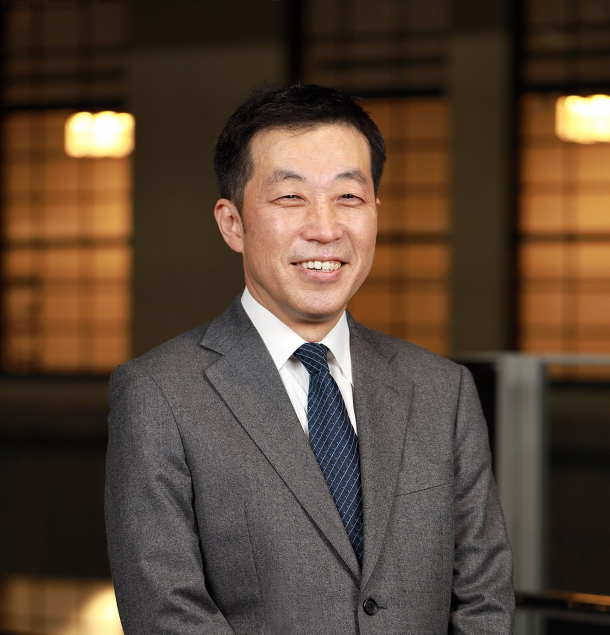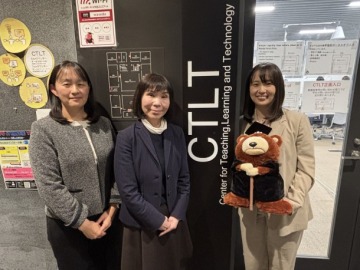Fall Semester 2022 Waseda University Presidential Teaching Award
Subject:Corporate Finance
SUZUKI Kazunori
The MSc in Finance (MSc-F) program, where this course is offered, is a program within the Graduate School of Business and Finance (Waseda Business School) especially tailored for those who want to work globally in the field of finance. Professor Suzuki, who also has extensive practical experience in the field of finance, says that his focus in this class is to acquire theory to become strong in practice.
Showing practical examples to help students understand the relationship between theory and practice.
While other programs in the Graduate School of Business and Finance often give preference to students with work experience, many students in this program enter graduate school directly after graduation from undergraduate school, partly because this program does not require work experience. All classes are conducted in English, and most students are international students.
This class focuses on issues faced by corporate financiers, such as selecting investment projects that maximize corporate value and choosing appropriate financial policies to persuade investors, and learn about evaluating investment projects, dividend policies, and corporate valuations, etc. As it is one of the first compulsory classes in the MSc-F two-year curriculum, it is intended to provide students with a thorough understanding of the contents of the textbook. “The content of the course is relatively well-defined, so we don’t try to do anything too fancy,” explained Professor Suzuki.
“Students in this program are particularly interested in finance, so many of them have a reasonable knowledge of the theoretical aspects of finance, but lack experience in the practical aspects of the field. Therefore, I try to show them real-life examples and talk about how the theory they have learned can be applied in the real world.”
Specifically, Professor Suzuki uses examples of actual transactions that are currently taking place and names of real companies to generate student interest. In addition, in order to deepen students’ understanding of the application of theory in practice, they not only solve exercises in the textbook, but also do practical exercises such as building models on spreadsheets, just as they do in financial practice. “I want students to learn not only by memorizing theories, but also by actually working with their hands to develop the ability to understand what is happening in the real world,” says Professor Suzuki.
Always consider students as “clients” and have a sense of equal partnership.
There is time for discussion even in the lecture-based classes. “Many of the students in this course are international students, and the Western students actively ask in-depth questions, which leads to more discussion. If Asian students do not ask many questions, I ask them questions and encourage them to speak up,” says Professor Suzuki.
Professor Suzuki explained that as he gained experience, he came to understand the characteristics of the students according to their home country. By looking at the composition of the students attending the course each year, Professor Suzuki makes adjustments in terms of what content to focus on, how to manage the course, and even how to speak. Many of the international students are from China, but Professor Suzuki pays attention to students from other countries who are attending the course alone. “Students from the same country tend to clump together, so I try not to make the other students feel isolated. I was once concerned about a student from a country where financial markets are not so well developed because the student did not speak up much in class, so I followed up by emailing the student individually.”
Personal questions from students will be discussed in the following class if they are related to the general content of the course. “I don’t think it’s a good idea to give certain knowledge only to a student who asks a question. It would be unfair if what I told only specific people would appear on the exam.”
Professor Suzuki doesn’t pay much attention to the average scores on the student course evaluations, but always makes sure to read through the comments. “I look at the comments to see if there is anything I can improve on,” he says. He has made changes in response to student requests, such as not covering enough cases, or wanting to cover different cases. “I am open to critical feedback as long as I am persuaded.”
What he keeps in mind is to be aware of “what the silent majority is thinking.” Professor Suzuki explains, “It means not to be pulled along by the few with big voices. I have had the experience of taking a student survey later in the class, only to find that something I changed (I thought) for the better received a negative evaluation. It is difficult to deal with students who express strong opinions, and if you say it wrong, it may be perceived as harassment. So, you need to explain why you cannot do it. We live in an era where ‘no means no’ does not cut it.”
This sincere attitude toward students is based on the recognition that “students are clients”. “I myself consider the relationship between faculty and students to be similar to that of a customer in the business world. Students are clients, and we must satisfy them, but we must not flatter them. We must always maintain a sense of distance, and keep the relationship as equal partners. To achieve this, I believe that we instructors must continue to improve our quality as well.”
If you have a theory that you can defend yourself with, it will be your strength as a practitioner.
After taking up the post at Waseda University, Professor Suzuki has continued to maintain contact with the field. “I still visit the M&A department I was in when I left the previous company about twice a month to consult on projects. I can learn and talk to students about the problems that practitioners are currently facing, which is good feedback for my classes. I also learn a lot about my own research themes from the real world.
The reason why Professor Suzuki decided to go into academia was because he wanted to “nurture strong practitioners”. “I am convinced that that learning about theory is a strength. There are many examples in the world of people who, because they made decisions based solely on experience and intuition without studying theory, got involved in dubious financial transactions and put their companies at risk of extinction. I have always wanted to reduce such tragedies as much as possible by teaching finance theory at a business school. I would like to continue teaching the knowledge necessary to become stronger in practice and to avoid making mistakes.”





